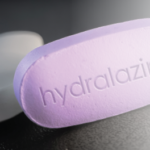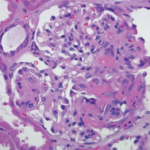It is an exciting time in the world of vasculitis research. More clinical studies and trials are being conducted now than at any time in history. In the past ten years, four drugs have been approved by the U.S. Food & Drug Administration (FDA) and other regulatory agencies specifically for the treatment of vasculitis: Rituximab was approved for the treatment of vasculitis associated with anti-neutophil cytoplasmic antibodies (ANCA) in 2011 and was the first drug ever approved in the U.S. for any form of vasculitis. This was followed in 2017 by the approval of tocilizumab for giant cell arteritis (GCA) and mepolizumab for eosinophilic granulomatosis with polyangiitis (EGPA). In 2019, apremilast was approved for the treatment of oral ulcers in Behçet’s disease.
This progress is the direct result of international collaborations among researchers and partnerships with industry. Vasculitis research networks and patient advocacy groups have played a major role in bringing together investigators from all over the world and developing a framework for research.
Vasculitis Research Networks
The vasculitides comprise rare, complex, multisystem diseases. Clinical research in vasculitis demands multidisciplinary expertise and multicenter collaboration. Research networks have facilitated collaboration among investigators and partnerships with industry and patient advocacy groups. Conducting research under the umbrella of networks allows easy communication among collaborators, who have the advantage of working with a core team of experts who can benefit from institutional memory.
Several national and multinational vasculitis research networks have been active in clinical research. The Vasculitis Clinical Research Consortium (VCRC) is a member of the Rare Diseases Clinical Research Network, which is funded by the National Institutes of Health (NIH) and led by the National Center for Advancing Translational Sciences (NCATS) through its Office of Rare Diseases Research (ORDR), and is the largest multinational research network dedicated to clinical and translational research in all forms of vasculitis.
VCRC studies have involved all the major centers for clinical investigation in vasculitis in the U.S. and Canada, and its trials have included more than 100 sites internationally. The consortium has conducted clinical trials; implemented longitudinal cohort studies with linked biospecimens leading to many clinical, epidemiologic, biomarker development, and genetic analyses; developed and validated outcome measures in vasculitis; and established an online patient research registry (the Vasculitis Patient-Powered Research Network [VPPRN]). The VCRC and the Vasculitis Foundation (VF) also support the training of young investigators through the VCRC-VF Vasculitis Fellowship; more than 20 VCRC-VF fellows have completed the program and now lead new vasculitis centers and conduct research in the field.
The European Vasculitis Society (EUVAS) is a multinational research network dedicated to research in vasculitis; it has a particular focus on clinical trials in ANCA-associated vasculitis. The VCRC and EUVAS have collaborated on many clinical projects, including several large, recently completed and currently active trials (see Table 1, below).
Table 1: CURRENT CLINICAL TRIALS IN VASCULITIS
| TRIAL NAME RESEARCH NETWORK | BRIEF DESCRIPTION | CURRENT STATUS/ LOCATION OF SITES | CLINICALTRIALS.GOV IDENTIFIER | |
|---|---|---|---|---|
| GIANT CELL ARTERITIS (GCA) | ||||
| Investigator Initiated | ABAGART VCRC | Phase 3 placebo-controlled RCT to determine safety and efficacy of abatacept to treat GCA | Will launch in early 2021, International | NCT04474847 |
| METOGIA, FVSG | RCT to compare tocilizumab to methotrexate to treat GCA | Recruiting, France | NCT03892785 | |
| Industry Sponsored | SELECT-GCA | Phase 3 placebo-controlled RCT to determine safety and efficacy of upadacitinib to treat GCA | Recruiting, International | NCT03725202 |
| CAIN-457 | Phase 3 placebo-controlled RCT to determine safety and efficacy of secukinumab to treat GCA | Will start recruitment in May 2021, International | Pending | |
| Phase 2 placebo-controlled RCT to determine safety and efficacy of mavrilimumab to treat GCA | Completed, results presented at ACR Convergence 2020 | NCT03827018 | ||
| Investigator Initiated | RCT comparing methotrexate, mycophenolate and glucocorticoids vs. cyclophosphamide and glucocorticoids followed by azathioprine and glucocorticoids | Recruiting, China | NCT03096275 | |
| Phase 3 trial to determine safety and efficacy of leflunomide in TAK | Planning | Pending | ||
| ANCA-ASSOCIATED VASCULITIS (AAV): GRANULOMATOSIS with POLYANGIITIS (GPA) and/or MICROSOPIC POLYANGIITIS (MPA) | ||||
| Investigator Initiated | RITAZAREM VCRC-EUVAS | Phase 3 RCT to compare rituximab to azathioprine to treat relapsing AAV | International, completed, final results presented at ACR Convergence 2020 | NCT01697267 |
| ABROGATE VCRC-EUVAS | Phase 3 placebo-controlled RCT to determine efficacy and safety of abatacept to treat relapsing, mild-moderate GPA | Recruiting, International | NCT02108860 | |
| TAPIR VCRC | RCT to compare maintenance with prednisone 5 mg daily for 6 months vs. discontinuation of prednisone in AAV | Recruiting, North America | NCT01933724 | |
| MAINEPSAN FVSG | RCT to compare maintenance with prednisone 5 mg daily for 12 months vs. discontinuation of prednisone in AAV | Recruiting, France | NCT03290456 | |
| RituxGoPro FVSG | RCT to determine efficacy of rituximab/glucocorticoids vs. glucocorticoids alone to treat non-severe MPA | Recruiting, France | NCT03920722 | |
| SATELITE FVSG | RCT to compare tocilizumab vs. abatacept vs. rituximab+cDMARD in treatment of refractory GPA | Recruitment will start in 2021, France | pending | |
| LEFAZAREM | RCT comparing leflunomide vs azathioprine for maintenance of remission in AAV | Recruitment will start in 2021, China | pending | |
| RCT comparing efficacy and safety of IV tocilizumab vs. IV cyclophosphamide in active AAV | Recruiting, Japan | |||
| Industry Sponsored | ADVOCATE | Phase 3 placebo-controlled RCT to compare avacopan with no glucocorticoids vs. glucocorticoids, both in addition to rituximab or cyclophosphamide, for inducing and sustaining remission of AAV | Completed, International | NCT02994927 |
| IXchange | Phase 2 RCT to investigate safety and efficacy of IFX-1. Part 1: Treatment with IFX-1 with varying doses of glucocorticoids to induce remission in AAV. Part 2: Treatment with IFX-1 alone vs. IFX-1 with glucocorticoids | Part 1: completed Part 2: recruiting, Europe | NCT03895801 | |
| IXplore | Phase 2 RCT to investigate safety and efficacy of two different dose regimens of IFX-1 to induce remission in AAV | Recruitment completed, North America | NCT03712345 | |
| ANCA-ASSOCIATED VASCULITIS: EOSINOPHILIC GRANULOMATOSIS with POLYANGIITIS (EGPA) | ||||
| Investigator Initiated | REOVAS FVSG | RCT to compare rituximab to conventional treatment to induce remission of EGPA | Study completed, results in 2021, France | NCT02807103 |
| MAINRITSEG FVSG | RCT to compare rituximab to azathioprine to maintain remission of EGPA | Recruiting, France | NCT03164473 | |
| EMERGE FVSG | RCT to compare mepolizumab to conventional treatment to induce remission of EGPA | Starting January 2021, France | Pending | |
| Industry Sponsored | MANDARA | Phase 3 RCT to compare the safety and efficacy of benralizumab vs. mepolizumab to treat EGPA | Recruiting, International | NCT04157348 |
| BEHÇET’S DISEASE | ||||
| Industry Sponsored | Phase 2 placebo-controlled RCT to determine safety and efficacy of pentoxyfylline gel to treat oral ulcers in Behçet’s disease | Recruiting, Turkey | NCT03888846 | |
| EOSINOPHILIC GRANULOMATOSIS with POLYANGIITIS, GIANT CELL ARTERITIS, GRANULOMATOSIS with POLYANGIITIS, MICROSCOPIC POLYANGIITIS, POLYARTERITIS NODOSOA or TAKAYASU’S ARTERITIS | ||||
| LoDoNaVasc VCRC | RCT comparing low-dose naltrexone vs. placebo for treatment of self-reported physical health | Recruiting, North America | NCT03482479 | |
| CUTANEOUS VASCULITIS | ||||
| ARAMIS VCRC | RCT comparing the efficacy of 3 drugs (azathioprine, colchicine and dapsone) in isolated cutaneous vasculitis | Recruiting, International | NCT02939573 | |
VCRC: Vasculitis Clinical Research Consortium; EUVAS: European Vasculitis Study Group; FVSG: French Vasculitis Study Group; VF: Vasculitis Foundation; RCT: randomized controlled trial; ANCA: anti-neutrophil cytoplasmic antibody; cDMARD: conventional disease-modifying anti-rheumatic drug; EGPA: eosinophilic granulomatosis with polyangiitis; GCA: giant cell arteritis; GPA: granulomatosis with polyangiitis; MPA: microscopic polyangiitis.
Several countries have national vasculitis research networks. The French Vasculitis Study Group (FVSG) has been particularly successful in conducting multicenter clinical trials, with a large number of centers in France participating in the work. Similar research networks in Canada, Japan and Turkey have conducted national studies and collaborated on multinational projects.
For many years, investigators from different parts of the world have met annually at the Vasculitis Investigators Meeting, hosted by the VCRC. At this major venue, investigators, representatives from industries, research networks and patient advocacy groups discuss the current state of clinical research in different types of vasculitis. This meeting also creates a platform to initiate novel projects and develop new collaborations. Over time, the meeting has experienced a significant increase in the number of participants and research projects presented, serving as a testament to the success of multinational collaboration.


